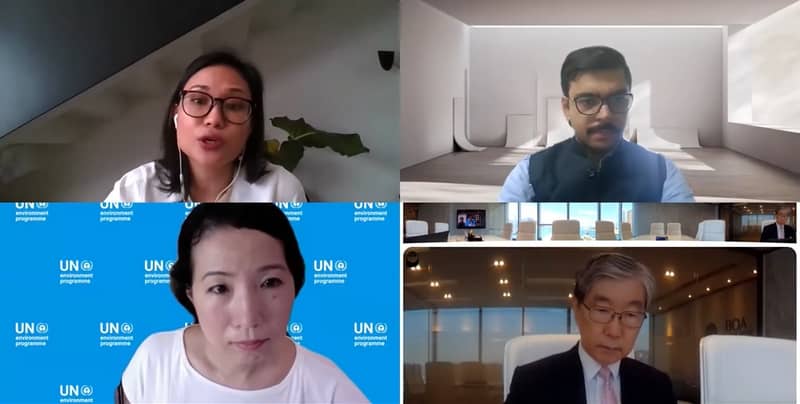On 14 and 15 September, the Economic and Social Commission for Asia and the Pacific (ESCAP) held the Green Fiscal Policy Network (GFPN) regional workshop, focusing on "Role of Fiscal Policies in A Green COVID-19 Recovery". Mr. Carson Wen, the Chairman and Founder of Bank of Asia and Member of Executive Council ESCAP Sustainable Business Network, was invited to the round table discussion on the topic of "fiscal policy as an enabler for scaling up private investment in support of a green recovery".
The impact of the Covid-19 pandemic has been catastrophic. In Asia-Pacific, real GDP growth fell from 6% in 2019 to -1.5% in 2020 and unemployment and inequality surged, with job losses concentrated amongst low-income workers, particularly women and youth. The crisis created an opportunity for policymakers to recalibrate existing policies and develop new, innovative strategies to mobilise revenue and drive a green, inclusive, low-carbon recovery.
UNESCAP's Economic and Social Survey of Asia and the Pacific in 2019 found that countries in the region would need to invest USD 1.5 trillion annually to 2030 to achieve the Sustainable Development Goals (SDGs), which is acknowledged as Agenda 2030. Successfully leveraging investment from the private sector will be essential to mobilise these funds.
However, the fact that private markets need an enabling environment and firm public finance foundations to exist and thrive is often overlooked. Pricing and regulatory incentives and institutional capacity reforms are key to creating and strengthening green and sustainable finance markets and scaling up financing for Agenda 2030 and higher ambition NDCs (Nationally determined contributions). The private sector makes investment decisions basing on the risk-return profile of investment opportunities, and the risk of investing in green and low-carbon technologies is often perceived to be high.
"Currently, we're facing double challenges: economic recovery from the pandemic, at the same time, climate change. We only have very little time left before we really would miss what was promised in the PARIS agreement." Illustrated by Carson Wen.
Carson also shared that China State Council released guidelines to boost green, low-carbon economy. In fact, according to a new sweeping guideline issued on Sunday (Sep 12), China will set up a green stock index and develop futures trading for carbon emission rights.
"My conclusion would be that to follow the old ways would not be how the economic recovery should take place. We do need to transform to a sustainable development module to move forward.” He explained, “It will encourage banking and financial institutions to provide green credit services. Banks are now steering towards making green credits in order to fit into the financial module of green project financing."
The workshop also exchanged views on findings from the global recovery observatory, sustainable public financing for a green recovery to achieve the SDGs and the PARIS agreement, the potential for fossil fuel subsidy reform and carbon pricing to contribute to a better future, and the political economy of green fiscal policies in the context of green recovery.
ESCAP serves as the United Nations' regional hub promoting cooperation among countries to achieve inclusive and sustainable development. UNESCAP - GFPN regional workshop explores the potential role of Green Fiscal Policies (GFPs) in greening the Covid-19 recovery with the aim of supporting public health efforts, reducing environmental and climate change risks, and strengthening resilience to future crises by embedding inclusive and sustainable socio-economic considerations in national economic planning.

